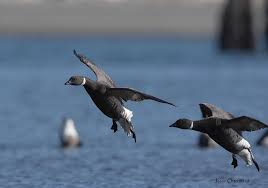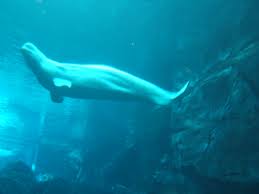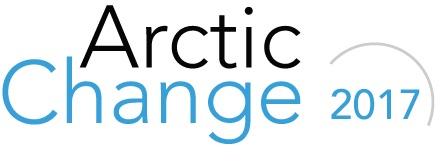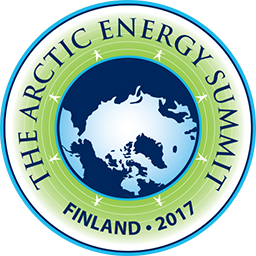|
|
|
|
|
|
|
|
No Arctic science events are scheduled for today.
|
Media
 A Tale of Two Goose Populations: Y-K Delta's Shrink, Arctic Coast's Expands. A Tale of Two Goose Populations: Y-K Delta's Shrink, Arctic Coast's Expands. For decades, the crowds of small, dark sea geese on the tundra of southwestern Alaska's Yukon-Kuskokwim Delta have been thinning, a situation opposite that of geese on the North Slope. The flat area between the mouths of the big Kuskokwim and Yukon rivers was, in the past, the dominant summer breeding area for the world's Pacific black brant population, according to earlier scientific reports. Alaska Dispatch News
Arctic Community's Successful Switch to Solar-Diesel Power Could be a Glimpse into the Future. A year after his tiny Arctic community became a test case for solar power in the North, it's the sounds that Alvin Orlias notices. "I'm standing outside right now and it's quiet," said the superintendent of Colville Lake's unique solar-diesel power plant. "You can hear birds chirping in the background." The Dene hamlet of about 150 people north of Great Bear Lake made history last year by becoming the first in the North to replace its near-derelict diesel generator - a common problem in the region - with a combination of diesel, batteries and a solar array capable of generating 160 kilowatts. The Star
Group Says Long-Awaited High Arctic Research Station is Nearly Complete. A decade after it was first promised, Canada's new High Arctic Research Station is nearly complete and already giving scientists access to a vast new section of ice and tundra. "We're trying to come up with a long-term, systematic, multi-disciplinary view of this part of the world, which is really understudied," said David Scott, president of Polar Knowledge Canada, which operates the new station in Cambridge Bay, Nunavut. A line item in the 2007 federal budget, the station was a centerpiece of former Prime Minister Stephen Harper's Arctic strategy. The Times Colonist
 'Snot for Science': How Blow-Hole Goop Could Help Track Stress in Manitoba Belugas. 'Snot for Science': How Blow-Hole Goop Could Help Track Stress in Manitoba Belugas. A penchant for high-pitched whistling long ago earned them the nickname "canaries of the sea," but it turns out that pleasant song isn't the only thing beluga whales emit that interests Arctic scientists. "The tentative title of my project is 'Snot for science: using blow to analyze stress hormones in the western Hudson Bay beluga population,'" Justine Hudson, a master's student in biological sciences at the University of Manitoba, said via Skype from Churchill, Man. Hudson spent the better part of July out on the cold waters of Hudson Bay near Churchill, about 1,000 kilometers north of Winnipeg. Yahoo! News
|
|
Future Events
Map Exhibit: Explore Alaska's Arctic Waters, August 4, 2017 (Anchorage, Alaska USA). Join Audubon Alaska to celebrate the release of our 'Ecological Atlas of the Bering, Chukchi, and Beaufort Seas,' a comprehensive atlas featuring over 100 maps of Arctic marine mammals, seabirds, sea ice, subsistence, and more. Come view a selection of our dynamic maps, learn about our conservation work in the Arctic, and find out how you can advocate for the protection of these ecologically vital places.
As the Symposium is organized jointly by two leading Research Institutes of Russian Academy of Science - Institute of Water Problems and Melnikov Permafrost Institute, particularly the contributions on following research topics are welcome:
- Observational evidences of change in coupled permafrost-hydrology system.
- Present state and future projections of local, regional and pan-Arctic hydrology.
- Modeling studies representing landscape evolution, dynamics of water storages and permafrost degradation.
- Impacts of permafrost hydrology changes on local communities.
VII International Conference on Cryopedology, August 21-25, 2017 (Yakutsk, Russia). The conference will be hosted by the Institute for Biological Problems of the Cryolithozone of the Siberian Branch of the Russian Academy of Sciences (SB RAS). Plenary reports will be organized in the hall of the Academy of Sciences of the Sakha (Yakutia) Republic. The official languages of the conference are English and Russian (with translation). All technical facilities (projectors, computers, video sets) will be available during the conference for presentation of papers. Additional information will be available soon. See the Facebook page here.
 2017 University of the Arctic Rectors' Forum and Conference, August 27-29, 2017 (Aberdeen, Scotland). This conference will also consider how northern scholarship can add to discussions on the North into broader terrains of intellectual engagement. In so doing, it will challenge dominant paradigms of research in both the natural and the social sciences, above all by calling into question the very separation of the world of nature from that of human society which underwrites the distinction between these two branches of scientific inquiry. In its place the conference will seek to forge a new practice of interdisciplinary research, done in collaboration with northern residents and on their terms, which recognizes that every discipline is itself an ongoing conversation, or a way of knowing, rather than a compartment within an overarching, hierarchically organized system of knowledge. Conversations from the North will, then, help to generate a science that is more open-ended, responsive to environmental variation and respectful of the wisdom of inhabitants. 2017 University of the Arctic Rectors' Forum and Conference, August 27-29, 2017 (Aberdeen, Scotland). This conference will also consider how northern scholarship can add to discussions on the North into broader terrains of intellectual engagement. In so doing, it will challenge dominant paradigms of research in both the natural and the social sciences, above all by calling into question the very separation of the world of nature from that of human society which underwrites the distinction between these two branches of scientific inquiry. In its place the conference will seek to forge a new practice of interdisciplinary research, done in collaboration with northern residents and on their terms, which recognizes that every discipline is itself an ongoing conversation, or a way of knowing, rather than a compartment within an overarching, hierarchically organized system of knowledge. Conversations from the North will, then, help to generate a science that is more open-ended, responsive to environmental variation and respectful of the wisdom of inhabitants.
- Small and off-grid community energy solutions
- Oil and gas development
- Renewable energy
- Regulation and Financing
- Transportation and transmission
The AES is a multi-disciplinary event expected to draw several hundred industry officials, scientists, academics, policy makers, energy professionals and community leaders together to collaborate and share leading approaches on Arctic energy issues.
2017 Arctic Circle Assembly, October 13-15, 2017 (Reykjavik, Iceland). The annual Arctic Circle Assembly is the largest annual international gathering on the Arctic, attended by more than 2000 participants from 50 countries. The Assembly is held every October at the Harpa Conference Center and Concert Hall and is attended by heads of states and governments, ministers, members of parliaments, officials, experts, scientists, entrepreneurs, business leaders, indigenous representatives, environmentalists, students, activists and others from the growing international community of partners and participants interested in the future of the Arctic.
 Polar Law Symposium 2017 and Rovaniemi Arctic Spirit, November 13-16, 2017 (Rovaniemi, Finland). The purpose of the Polar Law Symposium is to examine, in detail, the implications of the challenges faced by the Polar Regions for international law and policy and to make recommendations on appropriate actions by states, policy makers and other international actors to respond to these emerging and re-emerging challenges. The Rovaniemi Arctic Spirit Conference is integrated with the Polar Law Symposium, which will be organized by the Northern Institute for Environmental and Minority Law at the Arctic Center of the University of Lapland. Polar Law Symposium 2017 and Rovaniemi Arctic Spirit, November 13-16, 2017 (Rovaniemi, Finland). The purpose of the Polar Law Symposium is to examine, in detail, the implications of the challenges faced by the Polar Regions for international law and policy and to make recommendations on appropriate actions by states, policy makers and other international actors to respond to these emerging and re-emerging challenges. The Rovaniemi Arctic Spirit Conference is integrated with the Polar Law Symposium, which will be organized by the Northern Institute for Environmental and Minority Law at the Arctic Center of the University of Lapland.
ArcticNet invites the global Arctic research community to Arctic Change 2017! This conference will bring together Arctic researchers and students with Inuit, Northerners and government, industry and NGO stakeholders. The world's foremost Arctic scientists will present research findings and discuss impacts of climate change and modernization. With  over 1500 participants expected, Arctic Change 2017 will be one of the largest trans-sectoral international Arctic research conferences held in Canada. We welcome students and early career researchers to participate in "Student Day" at the start of the Conference. See an excerpt from last year: ArcticNet ASM2016. over 1500 participants expected, Arctic Change 2017 will be one of the largest trans-sectoral international Arctic research conferences held in Canada. We welcome students and early career researchers to participate in "Student Day" at the start of the Conference. See an excerpt from last year: ArcticNet ASM2016.
ISAR-5 Fifth International Symposium on Arctic Research, January 15-18, 2018 (Tokyo, Japan). The fifth ISAR has been planned at the recommendation of the science steering committee of ISAR-4, which was held in Toyama, Japan in April 2015. The fifth ISAR will be devoted to discussions on environmental changes in the Arctic and their regional and global implications, to seek additional international scientific collaboration in this area by gathering, synthesizing and sharing information related to these changes occurring in the Arctic. Special emphasis will be placed on the fields of the social sciences and humanities, which were not included in the previous ISARs. ISAR-5 will consist of general sessions and special sessions. The general sessions will address the following topics: atmosphere; ocean and sea ice; rivers, lakes, permafrost, and snow cover; ice sheets, glaciers, and ice cores; terrestrial ecosystems; marine ecosystems; geospace; policies and economy; and social and cultural dimensions. Special sessions will be solicited on cross-cutting themes.
The Effects of Climate Change on the World's Oceans, June 4-8, 2018 (Washington, DC USA).
The 4th International Symposium will bring together experts from around the world to better understand climate impacts on ocean ecosystems - and how to respond. The event is hosted by a variety of groups including International Council for the Exploration of the Sea (ICES), North Pacific Marine Science Organization (PICES), Intergovernmental Oceanographic Commission of UNESCO (IOC), and Food and Agriculture Organization of the United Nations (FAO).
 POLAR 2018, June 15-27, 2018 (Davos, Switzerland). POLAR2018 is a joint event from the Scientific Committee on Antarctic Research (SCAR) and the International Arctic Science Committee (IASC). The SCAR meetings, the ASSW and the Open Science Conference will be hosted by the Swiss Federal Institute for Forest, Snow and Landscape Research WSL under the patronage of the Swiss Committee on Polar and High Altitude Research. The WSL Institute for Snow and Avalanche Research SLF is organizing POLAR2018. POLAR 2018, June 15-27, 2018 (Davos, Switzerland). POLAR2018 is a joint event from the Scientific Committee on Antarctic Research (SCAR) and the International Arctic Science Committee (IASC). The SCAR meetings, the ASSW and the Open Science Conference will be hosted by the Swiss Federal Institute for Forest, Snow and Landscape Research WSL under the patronage of the Swiss Committee on Polar and High Altitude Research. The WSL Institute for Snow and Avalanche Research SLF is organizing POLAR2018.
Arctic Biodiversity Congress, October 9-11, 2018 (Rovaniemi, Finland). The second Arctic Biodiversity Congress is hosted by the Conservation of Arctic Flora and Fauna (CAFF), the biodiversity working group of the Arctic Council, and the Ministry of the Environment, Finland. The second Arctic Biodiversity Congress will build on the success of the first Congress, held in 2014 in Trondheim, Norway, and will bring together scientists, policymakers government officials, Indigenous representatives, Traditional Knowledge holders, industry, non-governmental organizations, and others to promote the conservation and sustainable use of Arctic biodiversity.
|
|

  
4350 N. Fairfax Drive, Suite 510
Arlington, VA 22203, USA
External links in this publication, and on the USARC's World Wide Web site ( www.arctic.gov) do not constitute endorsement by the US Arctic Research Commission of external Web sites or the information, products or services contained therein. For other than authorized activities, the USARC does not exercise any editorial control over the information you may find at these locations. These links are provided consistent with the stated purpose of this newsletter and the USARC Web site.
|
|
|
|
|
|
|
|
|
 A Tale of Two Goose Populations: Y-K Delta's Shrink, Arctic Coast's Expands. For decades, the crowds of small, dark sea geese on the tundra of southwestern Alaska's Yukon-Kuskokwim Delta have been thinning, a situation opposite that of geese on the North Slope. The flat area between the mouths of the big Kuskokwim and Yukon rivers was, in the past, the dominant summer breeding area for the world's Pacific black brant population, according to earlier scientific reports. Alaska Dispatch News
A Tale of Two Goose Populations: Y-K Delta's Shrink, Arctic Coast's Expands. For decades, the crowds of small, dark sea geese on the tundra of southwestern Alaska's Yukon-Kuskokwim Delta have been thinning, a situation opposite that of geese on the North Slope. The flat area between the mouths of the big Kuskokwim and Yukon rivers was, in the past, the dominant summer breeding area for the world's Pacific black brant population, according to earlier scientific reports. Alaska Dispatch News 'Snot for Science': How Blow-Hole Goop Could Help Track Stress in Manitoba Belugas. A penchant for high-pitched whistling long ago earned them the nickname "canaries of the sea," but it turns out that pleasant song isn't the only thing beluga whales emit that interests Arctic scientists. "The tentative title of my project is 'Snot for science: using blow to analyze stress hormones in the western Hudson Bay beluga population,'" Justine Hudson, a master's student in biological sciences at the University of Manitoba, said via Skype from Churchill, Man. Hudson spent the better part of July out on the cold waters of Hudson Bay near Churchill, about 1,000 kilometers north of Winnipeg. Yahoo! News
'Snot for Science': How Blow-Hole Goop Could Help Track Stress in Manitoba Belugas. A penchant for high-pitched whistling long ago earned them the nickname "canaries of the sea," but it turns out that pleasant song isn't the only thing beluga whales emit that interests Arctic scientists. "The tentative title of my project is 'Snot for science: using blow to analyze stress hormones in the western Hudson Bay beluga population,'" Justine Hudson, a master's student in biological sciences at the University of Manitoba, said via Skype from Churchill, Man. Hudson spent the better part of July out on the cold waters of Hudson Bay near Churchill, about 1,000 kilometers north of Winnipeg. Yahoo! News



 over 1500 participants expected, Arctic Change 2017 will be one of the largest trans-sectoral international Arctic research conferences held in Canada. We welcome students and early career researchers to participate in "Student Day" at the start of the Conference. See an excerpt from last year:
over 1500 participants expected, Arctic Change 2017 will be one of the largest trans-sectoral international Arctic research conferences held in Canada. We welcome students and early career researchers to participate in "Student Day" at the start of the Conference. See an excerpt from last year: 


